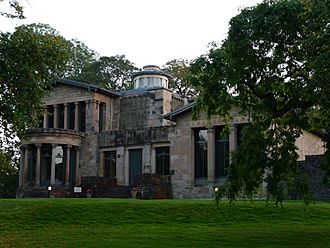Holmwood House facts for kids
Quick facts for kids Holmwood House |
|
|---|---|

Holmwood House
|
|
| General information | |
| Architectural style | Greek Revival |
| Town or city | Glasgow |
| Country | Scotland |
| Construction started | 1857 |
| Completed | 1858 |
| Cost | £3,682 |
| Client | James Couper |
| Technical details | |
| Structural system | masonry |
| Design and construction | |
| Architect | Alexander Thomson |
|
Listed Building – Category A
|
|
| Official name | 61, 63 Netherlee Road, "Holmwood" |
| Designated | 17 June 1967 |
| Reference no. | LB33944 |
Holmwood House is a beautiful and fancy house. It was designed by a famous Scottish architect named Alexander "Greek" Thomson. This house is special because it still has many of its original decorations inside. You can even visit it today!
Holmwood House is considered a very important building. It is a Category A listed building. This means it is a building of great historical or architectural importance. The house is located in Cathcart, a part of Glasgow, Scotland. The National Trust for Scotland now owns and cares for Holmwood House.
Many experts believe Holmwood's design was very important. It might have even influenced other famous architects. One of these was Frank Lloyd Wright. His designs were a bit like modern art.
Contents
The Story of Holmwood House
Building a Grand Home
Holmwood House was built for James Couper. He was a paper manufacturer. The house was constructed between 1857 and 1858. James and his brother owned a paper mill nearby.
The main rooms of Holmwood House faced a view of Cathcart Castle. This castle was taken down in 1980. Building the house cost about £2,608. The coach house, greenhouse, and other buildings cost another £1,009. Even the gates cost an extra £75!
Amazing Decorations Inside
The colorful decorations inside Holmwood House were designed by Thomson himself. An artist named Campbell Tait Bowie helped create them. The dining room has some of the most amazing decorations. It has a special border with pictures from John Flaxman's drawings. These drawings were inspired by Homer's famous story, the Iliad. The fireplace in the hall has sculptures made by George Mossman.
Changes Over Time
The house changed owners several times. In the 1920s, James Gray owned it and made some changes. After World War II, a vet named James McElhone and his family lived there.
In 1931, Thomas Redden Patterson bought the house. He and his wife, Margaret, started a clothing business in Glasgow. They also owned a yacht. This yacht even helped in the Dunkirk evacuation during the war. Thomas Patterson was recognized for his public service in 1954.
Later, a group of nuns, the Sisters of Our Lady of the Missions, bought Holmwood. They painted over many of the original decorations. The gardener's cottage was taken down in the 1970s. Part of the grounds was used for a Catholic primary school.
Saving Holmwood House
In the early 1990s, the nuns decided to sell the house. There was a worry that new houses would be built on the land. This would have ruined the beautiful setting of Holmwood House.
Luckily, the National Trust for Scotland stepped in. They bought the house in 1994. They received a lot of help from the National Heritage Memorial Fund. The house was then carefully restored between 1997 and 1998. The team worked to bring back its original look. They even rebuilt a wall that connected to the coach house. Experts studied the old paint to make sure the colors were just right.
Holmwood's Place in History
A Special Banknote
In 1999, Glasgow was named the UK City of Architecture and Design. To celebrate, the Clydesdale Bank made a special £20 banknote. This note featured a picture of the dome of Holmwood House. It also showed the Lighthouse building in Glasgow. The other side of the note had a picture of Alexander Thomson.
Another Holmwood in Australia
Did you know there's another "Holmwood" house? It was built in 1885 in North Walkerville, Adelaide, Australia. This house was built for a rich mining owner named William Austin Horn.
This Australian Holmwood was also based on Thomson's designs. These designs were published in a book in 1868. The book also showed other designs by Thomson. Even though the Australian Holmwood looks a lot like the one in Scotland, the rooms inside are quite different.
See also
- List of Category A listed buildings in Glasgow
- Millbrae Crescent

